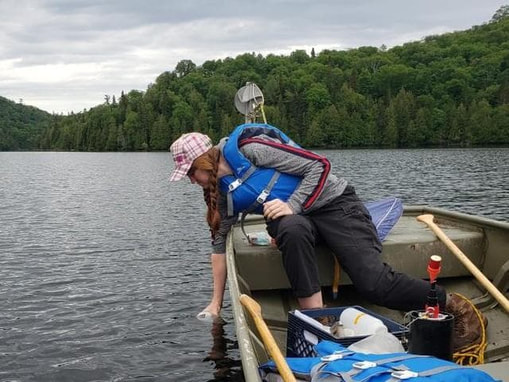 Ellen Cameron shared insights from her PhD research at the University of Waterloo studying cyanobacterial communities in temperate watersheds on June 22nd, 2021. Contact Elanor Waslander for access to the webinar recording. Webinar description: Cyanobacteria, a group of potentially toxic photosynthetic bacteria, threaten water quality globally warranting the implementation of monitoring programs for risk management and control. Their distribution in aquatic ecosystems is dynamic and impacted by spatiotemporal factors including water column stratification, oscillatory diurnal migrations via buoyancy regulation and seasonal succession of populations. Although cyanobacteria are characteristically associated with high nutrient systems, increased reports of cyanobacteria in low-nutrient temperate lakes of Ontario suggesting additional factors influencing growth and occurrence requiring further investigation. In this research, spatiotemporal shifts in cyanobacterial communities were explored to identify the (i) vertical distribution across the water column, (ii) short-term diel trends, and (iii) long-term seasonal trends across three interconnected, oligotrophic lakes in a northern, temperate watershed in Ontario: the Turkey Lakes Watershed. Although the lakes in this study are interconnected, the cyanobacterial communities within them exhibited unique composition and distribution trends impacted by surrounding landscape processes. This complex network of interactions impacting cyanobacterial communities will further be impacted by warming climates with the potential for resurgence of populations earlier in the season. The unique composition observed in the three lakes of this study underscores the importance of developing system-specific sampling guidelines reflective of physicochemical characteristics of the system and cyanobacterial community structure. Ellen Cameron's biography
Ellen is an aquatic ecologist who has a specialized research interest in algae. She is interested in the application of modern molecular techniques to explore ecosystem dynamics. Ellen holds a BSc in Biology from the University of Waterloo. She completed her MSc in Molecular Science from Ryerson University where her research focused on the impact of warming water temperatures on fatty acid composition in freshwater diatoms. Ellen is currently completing her PhD at the University of Waterloo in Biology and the Collaborative Water Program. Upon completion of her PhD, she will begin a postdoctoral fellowship at European Molecular Biology Laboratory - European Bioinformatics Institute and the Wellcome Sanger Institute where she will continue to build her molecular and bioinformatic skills while working with lichens.
0 Comments
Leave a Reply. |
forWater NetworkThe Network provides insights into new scientific research for safe, secure drinking water---globally---which starts with resilient forests Archives
October 2023
Categories |


 RSS Feed
RSS Feed

